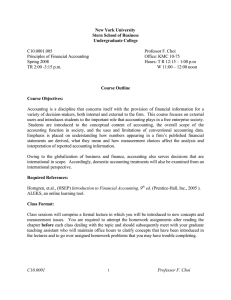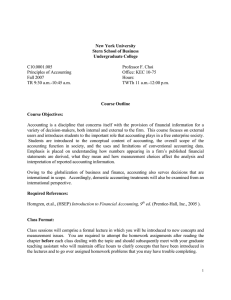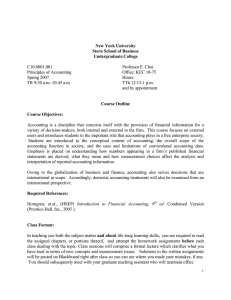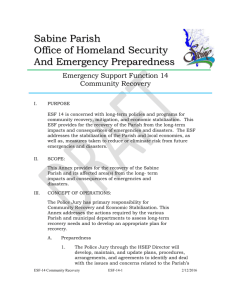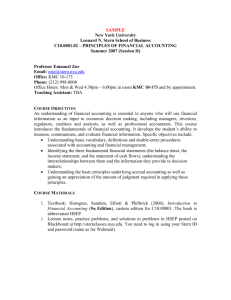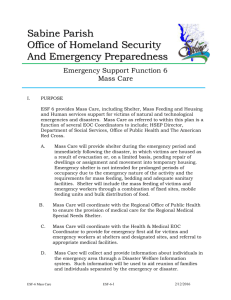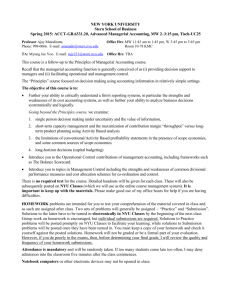B01.1306.91 Professor F.
advertisement
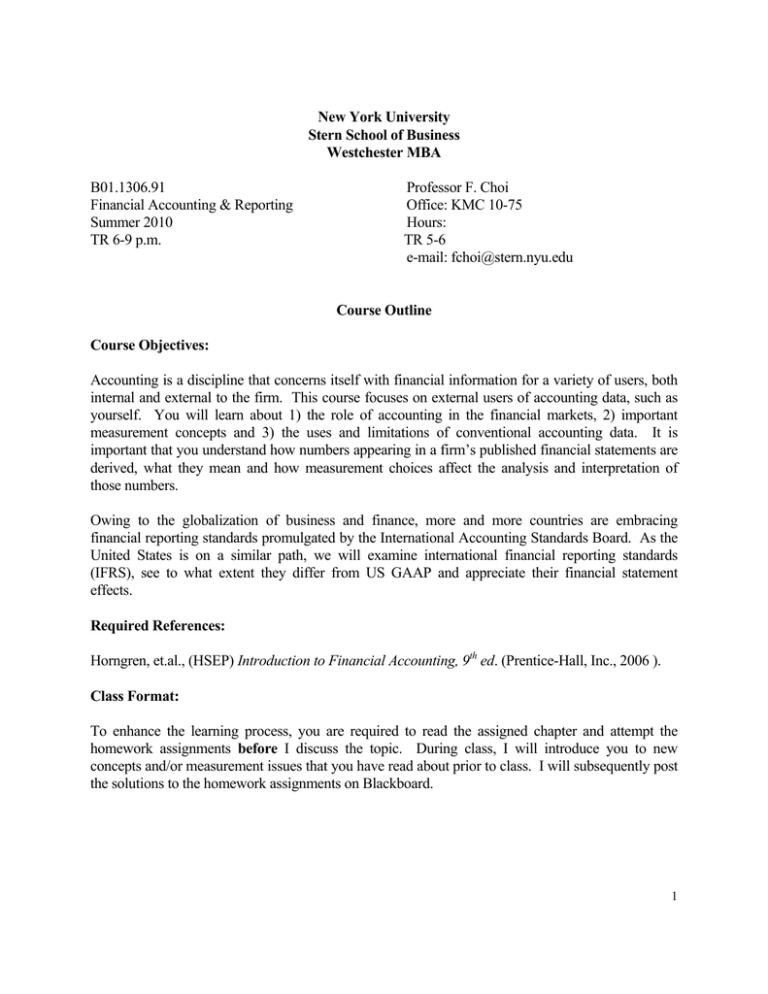
New York University Stern School of Business Westchester MBA B01.1306.91 Financial Accounting & Reporting Summer 2010 TR 6-9 p.m. Professor F. Choi Office: KMC 10-75 Hours: TR 5-6 e-mail: fchoi@stern.nyu.edu Course Outline Course Objectives: Accounting is a discipline that concerns itself with financial information for a variety of users, both internal and external to the firm. This course focuses on external users of accounting data, such as yourself. You will learn about 1) the role of accounting in the financial markets, 2) important measurement concepts and 3) the uses and limitations of conventional accounting data. It is important that you understand how numbers appearing in a firm’s published financial statements are derived, what they mean and how measurement choices affect the analysis and interpretation of those numbers. Owing to the globalization of business and finance, more and more countries are embracing financial reporting standards promulgated by the International Accounting Standards Board. As the United States is on a similar path, we will examine international financial reporting standards (IFRS), see to what extent they differ from US GAAP and appreciate their financial statement effects. Required References: Horngren, et.al., (HSEP) Introduction to Financial Accounting, 9th ed. (Prentice-Hall, Inc., 2006 ). Class Format: To enhance the learning process, you are required to read the assigned chapter and attempt the homework assignments before I discuss the topic. During class, I will introduce you to new concepts and/or measurement issues that you have read about prior to class. I will subsequently post the solutions to the homework assignments on Blackboard. 1 B01.1306.91 Professor F. Choi Grading Policy: A letter grade will be assigned to you on the basis of your score out of 500 possible points in the course. The sources of points are: Two mid-term exams (100 points each) Final exam Class participation Cases Total 200 points 150 points 50 points 100 points 550 points Cases: Cases are due in the next class after the material illustrated by the case has been discussed. To receive credit for the cases, they must be turned in before class begins. I prefer that you turn in a hard copy. You may choose to work in small groups or individually. Code of Conduct: I will “bend over backwards” to help you learn the material in this course. All I ask is that you do not cheat yourself, your fellow classmates or the Stern School. Upon enrollment in this course, you agree to adhere to Stern’s MBA Honor Code and accept the consequences of your actions should you violate that code. Instances of academic misconduct will be immediately reported to the appropriate administrators. Students with Disabilities If you have a disability that you feel may affect your class performance, please let me know early in the semester so that arrangements can be made, in consultation with the Henry and Lucy Moses Center for Students with Disabilities, to accommodate your needs. Please see www.nyu.edu/csd for more information. General Information: This is a demanding course that will require at least three hours of preparation for each hour of class on average. However, if you make the effort you will learn a lot and reap large dividends during your professional career. If you encounter difficulties completing the assignment, stop, isolate your problems and bring your questions to class. It is important that you keep up with the coursework. The subject matter of this course does not lend itself to last-minute cramming as new material builds on prior concepts. 2 B01.1306.91 Professor F. Choi COURSE TOPICS AND ASSIGNMENTS Lecture Dates 5/18 T Topics Economic scarcity; resource allocation decisions; decision-making re-examined; role of accounting in industrialized and less-industrialized economies. Read HSEP, Ch. 1(pp. 2-8) Nature of investment decisions; time preference for money; compound interest concepts; decision-making under conditions of certainty - NPV model of investment choice. Read HSEP, Ch. 9 (pp. 418-424) Prepare E9-41, E9-42, E9-47, E9-46, E9-47 5/20 Th Present value model continued; consistency; sensitivity; present value and wealth; present value and income. Decision-making under conditions of uncertainty; feasibility of present value data; cash flow and management forecasts; enterprise performance; cash flow vs. conventional accounting income. Read HSEP, Ch. 2 (pp. 46-61) Prepare: E2-36, P2-44, P2-55 3 B01.5306.91 5/25 T Professor F. Choi 1 Financial position and the accounting equation; transactions analysis. Read HSEP, Ch. 1 (pp. 8-16); Ch. 2 (pp. 63-70) Prepare: P2-46, P2-47, P2-53 Conventional accounting-some elaboration; disposable wealth; gains and losses and performance measurement. Read HSEP, Ch. 12 (pp. 565-569) Prepare Class Handout 5/27 Th Conventional accounting and changing prices; price-level adjusted operating income; price level adjusted net income; monetary gains and losses. Read Supplemental Reading: “Accounting for Changing Prices: The General Price Level Model,” the Replacement Cost Model and the Market Value Model (pp. 1-10) Prepare Exercises 1-4 (at end of reading material) Current exchange valuation framework; money vs. physical capital; current cost-based rating income; current cost-based net income, market-value-based accounting. Read Supplemental Reading: “Accounting for Changing Prices: The General Price Level Model, The Current Cost Model and the Market value Model,” (pp. 11-12). Prepare Exercises 5, 6, 7, 10, 11 (at end of reading material). 4 B01.1306.91 6/1 T Professor F. Choi First Mid-term Exam Accounting policy-making in a historical and institutional context; globalization of business and capital markets; international accounting standards and organizations. Read HSEP, Ch. 1, (pp. 26-34). 6/3 Th Cycle I Conventional accounting re-visited; accounting cycle as in information system; aggregation of accounting data; allocating accrual-based measures to appropriate time periods. Read HSEP, Ch. 3 (pp. 90-111), Ch. 4 (pp. 138-151). Prepare P3-34, P3-37, P4-35, P 4-38. Cycle II Accounting cycle illustrated. Read HSEP, Ch. 3 (pp. 111-120); HSEP, Ch. 4(pp. 154-162) Prepare P4-30, P4-54 6/8 T First case due. The Statement of Cash Flows Read HSEP, Ch. 5 Prepare P5-55, P5-58, P5-63. 5 B01.1306.91 Professor F. Choi Financial ratios and analysis- horizontal analysis; vertical analysis; ratio analysis including eps and P/E multiples. Read HSEP, Ch. 12 (pp. 534-565), Section entitled, “The Portfolio” between pp. 76 and 77 Prepare E12-32, E12-39, P12-43 6/10 Th Revenue recognition refinements; collection uncertainties. Read HSEP, Ch. 6(pp. 231-251) Prepare E6-35, E6-45, P6-55 Inventories-costing methods; IFRS treatment; financial statement effects. Read HSEP, Ch. 7 Prepare P7-56, P7-71, P7-75 6/15 T Fixed assets-acquisition, use, IFRS treatment. Read HSEP, Ch. 8 Prepare E8-46, E8-48, E8-55, E8-63. Corporate investments; marketable securities; long-term investments. Read HSEP, Ch. 11 (pp. 488-503) Prepare E11-29, E11-36, P11-39 6 B01.1306.91 6/17 Th Professor F. Choi 2nd Mid-Term Exam Liabilities I - short-term debt; long-term debt; marking to market. Read HSEP, Ch. 9 (pp. 382-404) Prepare P9-56, P9-58, P9-61 6/22 T 2rd case due. Liabilities II - deferred taxes, leases, pensions. Read HSEP, Ch. 9 (pp. 405-415) Prepare P9-66, P9-69, P9-70 Equity – proprietorships, partnerships, corporations; treasury stock; stock dividends/splits; stock options. Read HSEP, Ch. 1 (pp. 18-23; 29-32), Ch. 10(pp. 440-469) Prepare E10-42, P10-45, P10-56 6/24 Th Q@A Final Exam 7
